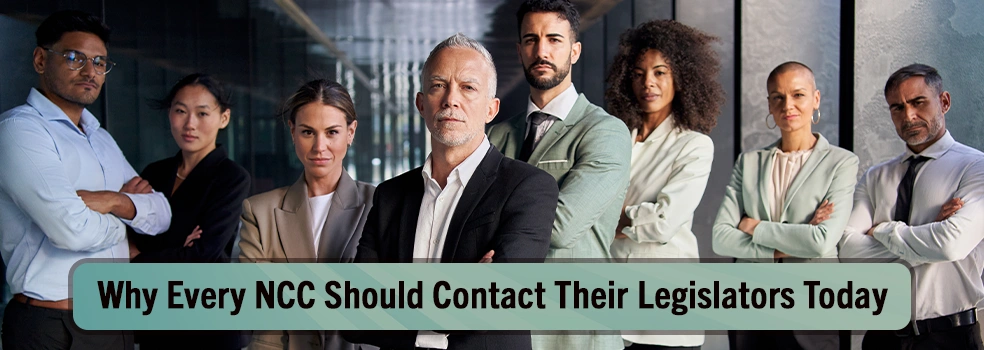
Brian D. Banks
NBCC Chief of Government Affairs, Executive Director of the Policy, Advocacy, and Research in Counseling Center (PARC)
Six years ago, I began my journey supporting the needs of counselors through my expertise within the field of government relations. During my first month on the job, I had several counselors inform me that they did not need to engage in legislative advocacy. When I asked why, the answers varied, but one stuck with me and I have heard it repeatedly over the years. That answer is in some variation of “I am an NCC, and NBCC has a Government Affairs Department; they do the work for me.” Other answers included “I am a member of my association and that’s what I pay my dues for.” Although it is true that NBCC, ACA, ACES, AMHCA, and other organizations are deeply involved in advocating for the counseling profession, the power of the individual counselor in advocacy efforts should not be underestimated. I saw this as an opportunity to inform people of the power they may not know they possess.
In the age where many are turning to ChatGPT or another form of artificial intelligence (AI) for information, the voice of personal experience is at risk of being lost. Legislative change is not always easy, and definitely not always convenient as AI, but it should be informed by people who are experts—you. The personal experience that you can communicate to your legislators is a powerful tool in impacting change. They need to hear how current or proposed bills affect you, your work, and the community that you serve.
As a National Certified Counselor (NCC), you see the transformative power of counseling every day, helping clients navigate addiction, trauma, and other mental health challenges. The exciting thing is that the power you possess in that expertise doesn’t stop at your counseling office door. By actively engaging with legislators, you have the opportunity to leverage your voice to actually change the system that impacts your clients—and your profession.
The Impact of Counselor Engagement
When counselors step into the legislative arena, they become more than mental health experts, they become advocates for change. Legislators rely on professionals like you to inform policies that shape mental health funding, licensing laws, insurance requirements, and availability of care. Your insights can influence laws that expand mental health services, reduce barriers, and ensure your clients receive the support they need.
Being involved means you help set the agenda, advocate for fair policies, and ensure that the voices of those with lived experience and the professionals who serve them are heard. It is about translating your day-to-day work into tangible policy wins that benefit entire communities. Plus, it’s empowering knowing you’re not only treating symptoms but also shaping the system that delivers care.
The Benefits of Being Involved
Influence policy: Your expertise can directly impact legislation that affects licensing, scope of practice, and funding. Imagine a law that makes mental health services more accessible—your voice is crucial in making that happen.
Build professional credibility: When you advocate for your profession, you position yourself as a leader, not only a counselor. This can open doors for collaborations, speaking opportunities, leadership roles, and more.
Protect your practice: Advocacy helps prevent policies that could limit your scope of practice or impose unnecessary regulations. Being proactive means you’re shaping the rules rather than just reacting to them.
Empower your clients: When policies support mental health initiatives, your clients benefit from improved access and quality of care. Your involvement can help destigmatize mental health issues on a larger scale.
The Consequences of Staying Silent
Now, let’s talk about what happens if you choose to stay on the sidelines. The truth is, if counselors don’t engage, the system continues to evolve without your voice—and not always in ways that benefit your clients, your profession, or you.
Loss of influence: Legislators often listen to those with a stake in the outcome. If counselors aren’t at the table, other stakeholders—including business interests, insurance companies, or special interest groups—take the lead in shaping policies impacting mental health care.
Diminished professional power: Without advocacy, your profession risks being undervalued, underfunded, and shuffled to the sidelines of health care. Laws and policies could be enacted that limit your scope of practice or reduce reimbursement rates, making it harder to serve your clients effectively.
Missed opportunities for change: Every policy debate is a chance to advocate for better mental health services. If you’re not involved, you’re letting others decide your future—and their priorities may not align with yours.
Burnout and frustration: Feeling powerless in the face of systemic issues can lead to frustration and burnout. Engaging in advocacy can be a way to reclaim your agency and find purpose beyond the counseling office.
The Bottom Line
Counselors have a unique and vital role in shaping mental health policy. Your expertise can lead to systemic change that benefits your clients, your profession, and your community.
So, get involved. Talk to your legislators. Join professional associations that advocate for mental health. Attend hearings, write letters, make phone calls, and show up. The more we stand together, the louder our collective voice becomes.
To advocate today, please visit the NBCC Grassroots Action Center. There, you can take action on several issues in a matter of minutes, but don’t stop there! Visit the PARC website for Legislative Resources. We’ve made it easier for you to become a better advocate and will continue to do so. This professional community is stronger and better because of your engagement.